
When you select a lithium battery of sleep therapy devices, prioritize these factors:
Capacity and runtime
Device compatibility
Advanced safety mechanisms
Regulatory compliance
Portability
A high-quality lithium battery of sleep therapy devices ensures consistent operation for patients with sleep apnea. Your choice will directly impact device reliability and patient health outcomes.
Key Takeaways
Choose a lithium battery with enough capacity to power your sleep therapy device for at least 8 to 12 hours to ensure uninterrupted treatment, especially during travel or power outages.
Always verify that the battery matches your device’s voltage, connector type, and safety certifications to avoid damage and ensure reliable, safe operation.
Select lightweight, FAA-approved batteries with smart charging and safety features to balance portability, convenience, and protection during use and transport.
Part 1: Selection Criteria
1.1 Capacity & Runtime
When you evaluate a lithium battery of sleep therapy devices, battery capacity and runtime should be your first consideration. Battery capacity, measured in watt-hours (Wh), determines how long your device will operate before needing a recharge. For sleep therapy applications such as CPAP and BiPAP machines, industry standards recommend a minimum battery runtime of 8-12 hours, with battery capacity typically ranging from 300 to 800 Wh. This ensures uninterrupted therapy for 1-3 nights, even during travel or power outages.
Device Type | Recommended Minimum Runtime | Typical Battery Capacity Range | Key Features / Notes |
|---|---|---|---|
Respiratory Support | 8-12 hours | 300-800 Wh | Covers 1-3 nights of therapy; compact design |
CPAP/BiPAP Machines | 8-12 hours | 300-800 Wh | Travel-friendly, USB charging, humidifier compatible |
Home Ventilators | 24-48 hours | 2,000-5,000 Wh | Hospital-grade reliability, safety systems |
Infusion Pumps | 4-8 hours | 200-500 Wh | Portable, precise voltage regulation |
Higher battery capacity directly translates to longer operational hours. For example, a 99Wh battery can power a Z2 device for over 8 hours, while a 307Wh cpap backup battery may last 4-6 nights. However, real-world runtime can be affected by conversion losses, battery aging, and device settings. You should always select a lithium battery of sleep therapy devices with a capacity that exceeds your minimum requirements to account for these factors.
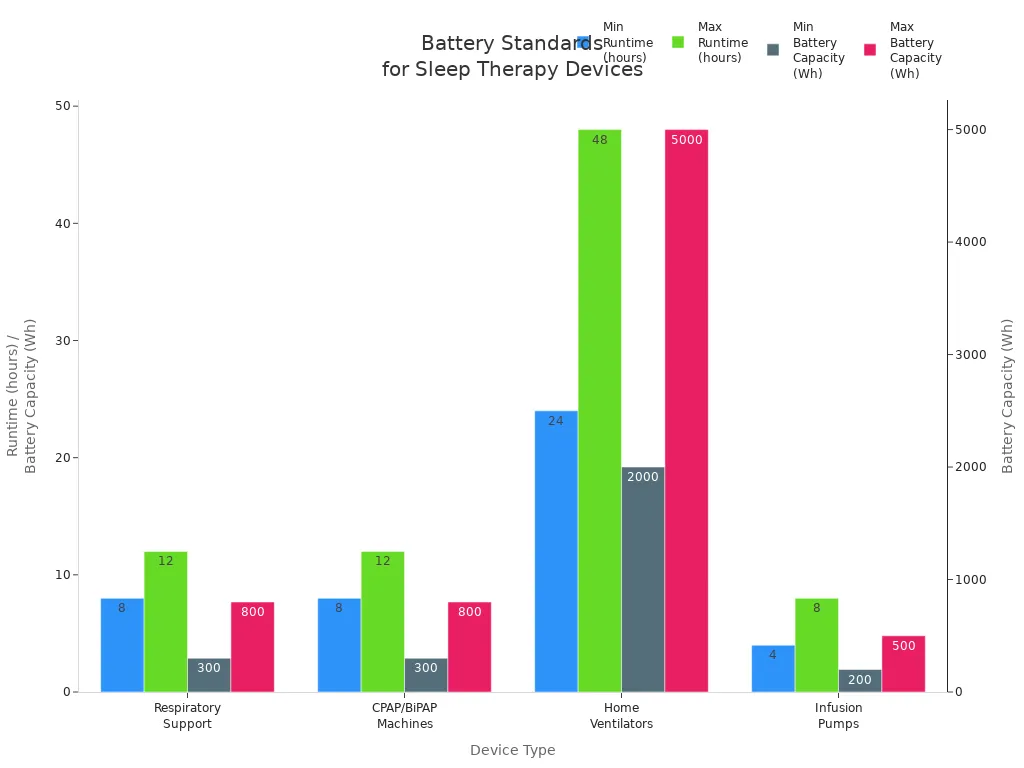
Tip: Always verify the battery runtime under your device’s specific settings, especially if you use humidification or higher pressure levels.
1.2 Compatibility
Compatibility between the lithium battery of sleep therapy devices and your equipment is critical. You must confirm that the cpap backup battery matches the voltage, wattage, and connector type of your device. Incompatibility can lead to inefficiency or even damage. Some CPAP models, such as certain ResMed units, require special adapters or power converters to connect properly to lithium-ion batteries.
Check the following technical specifications:
Battery size and type (e.g., AA, 9V, custom pack)
Power source requirements (AC adapter, external DC, USB)
Recharge time and battery life
Manufacturer compatibility, especially for external or backup power supplies
Environmental factors (temperature, humidity)
Backup power options (AC/DC adapters, external packs)
Replacement and recharge cycles
Technical Specification / Factor | Details / Considerations |
|---|---|
Battery Size and Type | Must match device requirements (e.g., AA vs 9V) |
Power Source Requirements | AC adapter, battery, or external DC-powered device compatibility must be verified |
Recharge Time | Varies by battery type; 9V batteries may require 5-8 hours or up to 24 hours to recharge |
Battery Life | Depends on battery type, usage habits, and environmental conditions; rechargeable batteries last 5-8 hours peak usage |
Manufacturer Compatibility | Essential to confirm compatibility especially for external DC-powered or backup power supplies |
Environmental Factors | Ambient temperature and humidity affect battery life; low temperatures reduce battery longevity significantly |
Backup Power Options | Some devices support AC/DC adapters, external battery packs, or backup setups (e.g., Philips Respironics DreamStation Auto) |
Battery Replacement and Recharge Cycles | Rechargeable batteries need replacement after several years and a certain number of recharge cycles |
Note: Always use approved cpap backup battery models and adapters to avoid warranty issues and ensure safe operation.
1.3 Size & Weight
Portability is a major factor for cpap travel batteries. You need a battery that balances weight, size, and runtime. Most cpap travel batteries weigh between 1 and 2 lbs and measure less than 9 inches in length, making them easy to carry in luggage or use during air travel. FAA approval is essential for uninterrupted therapy on flights.
Battery Model | Weight | Dimensions (inches) | Capacity (Wh) | Runtime (hours/nights) |
|---|---|---|---|---|
Medistrom Pilot-24 Lite | 1.3 lbs | 6.7 x 3.5 x 0.8 | 95 Wh | 14-16 hours (1-2 nights) |
NiteOwl System Kit | 2 lbs | 8.7 x 4.8 x 0.9 | 150 Wh | 2-3 nights |
CPAP Battery Bank EXP96PRO APEX | 6.5 lbs | 3.2 x 6 x 8.25 | 307.2 Wh | 4-6 nights |
PowerShell Extended Life Battery | 15.5 oz (0.97 lbs) | 6.3 x 4 x 3.25 | N/A | ~8.9 hours |
Transcend Micro PowerAway Battery | 16.7 oz (~1.04 lbs) | 4.8 x 5.2 x 1.3 | 71 Wh | ~17.5 hours |
Portable Outlet UPS CPAP Battery | 3 lbs | 10.75 x 8.5 x 2.25 | N/A | ~8 hours |
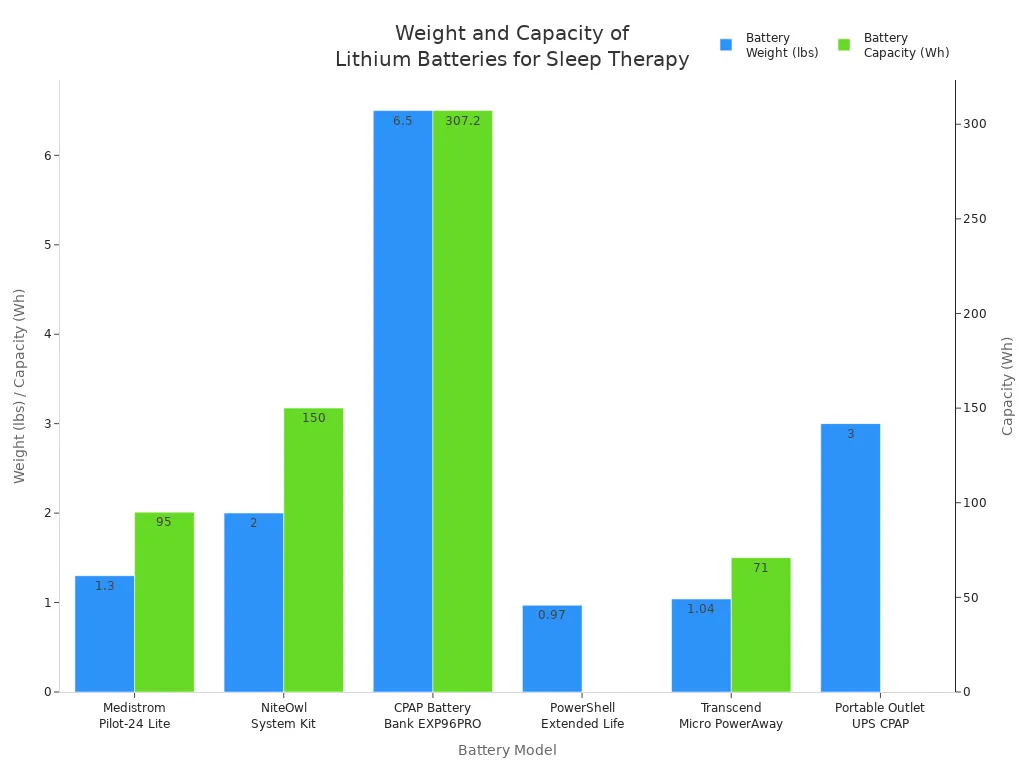
Lightweight cpap travel batteries improve compliance and portability.
Smaller batteries offer convenience but may require frequent recharging.
Larger batteries provide longer runtime but reduce portability.
Tip: Choose cpap travel batteries that fit your travel needs and runtime expectations. FAA-approved models are ideal for frequent flyers.
1.4 Charging
Charging options play a vital role in operational efficiency and battery lifespan. You should select cpap travel batteries with smart charging systems and Battery Management Systems (BMS) to protect against overcharging, overheating, and short circuits. For LiFePO4 batteries, use chargers designed for the chemistry to ensure proper charging profiles. Avoid charging at extreme temperatures and recharge before the battery drops below 20-30% capacity.
Use chargers designed for your battery chemistry (LiFePO4, NMC, etc.).
Avoid charging below 32°F (0°C) or above 113°F (45°C).
Recharge before deep discharge; maintain 50-90% state of charge.
Store batteries at 50-70% charge for long-term storage.
Disconnect from charger once fully charged.
For more details on advanced BMS and protection circuits, visit Battery Management Systems (BMS).
Smart BMS regulate charging and usage, monitor individual cell performance, and provide thermal protection. These features extend battery life and enhance safety for lithium battery of sleep therapy devices.
1.5 Safety Features
Safety is non-negotiable for cpap backup battery packs. Regulatory bodies mandate several safety features for lithium battery of sleep therapy devices, including:
Safety Feature | Description | Application to Sleep Therapy Devices |
|---|---|---|
Battery Testing Standards | Must pass UN Manual of Tests and Criteria, Part III, Subsection 38.3 | Ensures batteries meet international safety standards |
Protection Against Short Circuits | Terminals insulated or enclosed | Prevents electrical hazards |
Limits on Battery Capacity | Not to exceed 100 Wh (160 Wh with approval) | Reduces risk of fire or explosion |
Handling Instructions | Devices switched off in checked baggage | Ensures safe transport |
Packaging and Labeling | Spare batteries in carry-on, properly packaged | Regulates safe carriage during air travel |
Notification Requirements | Pilot informed of lithium batteries aboard | Enhances safety awareness |
Protection Against Damage | Secure attachment or rigid packaging | Prevents physical damage |
Quantity Restrictions | Limits on number and size of spares | Minimizes risk during transport |
Common causes of lithium battery failures include mechanical, electrical, and thermal faults. Safety features such as protection vents, current fuses, robust casings, and advanced thermal management systems mitigate these risks. Fire detection and suppression systems further enhance safety.
Alert: Always use cpap backup battery packs with certified safety features and follow manufacturer guidelines for handling and transport.
1.6 Compliance
Compliance with international standards is essential for B2B procurement. Lithium battery of sleep therapy devices must meet certifications such as UN38.3 for transport safety, IEC 62133 for battery safety, FDA 510(k) for medical-grade devices, and CE Mark for European regulatory approval. ISO 13485 ensures quality management, while IPX4 certifies water resistance.
Standard / Certification | Purpose / Application |
|---|---|
UN38.3 | Safe transport of lithium batteries |
IEC 62133 | Battery safety standard |
FDA 510(k) | Medical device clearance |
IEC 60601-1-8 | Medical alarm system compliance |
CE Mark (MDD 93/42/EEC) | European regulatory approval |
ISO 13485 | Quality management system |
IPX4 | Water resistance standard |
For more on sustainability and responsible sourcing, visit Our Approach to Sustainability.
If you require conflict minerals documentation, see our Conflict Minerals Statement.
You should always verify that cpap travel batteries and cpap backup battery packs meet these standards before procurement. This ensures legal compliance, patient safety, and operational reliability.
Part 2: Battery Types
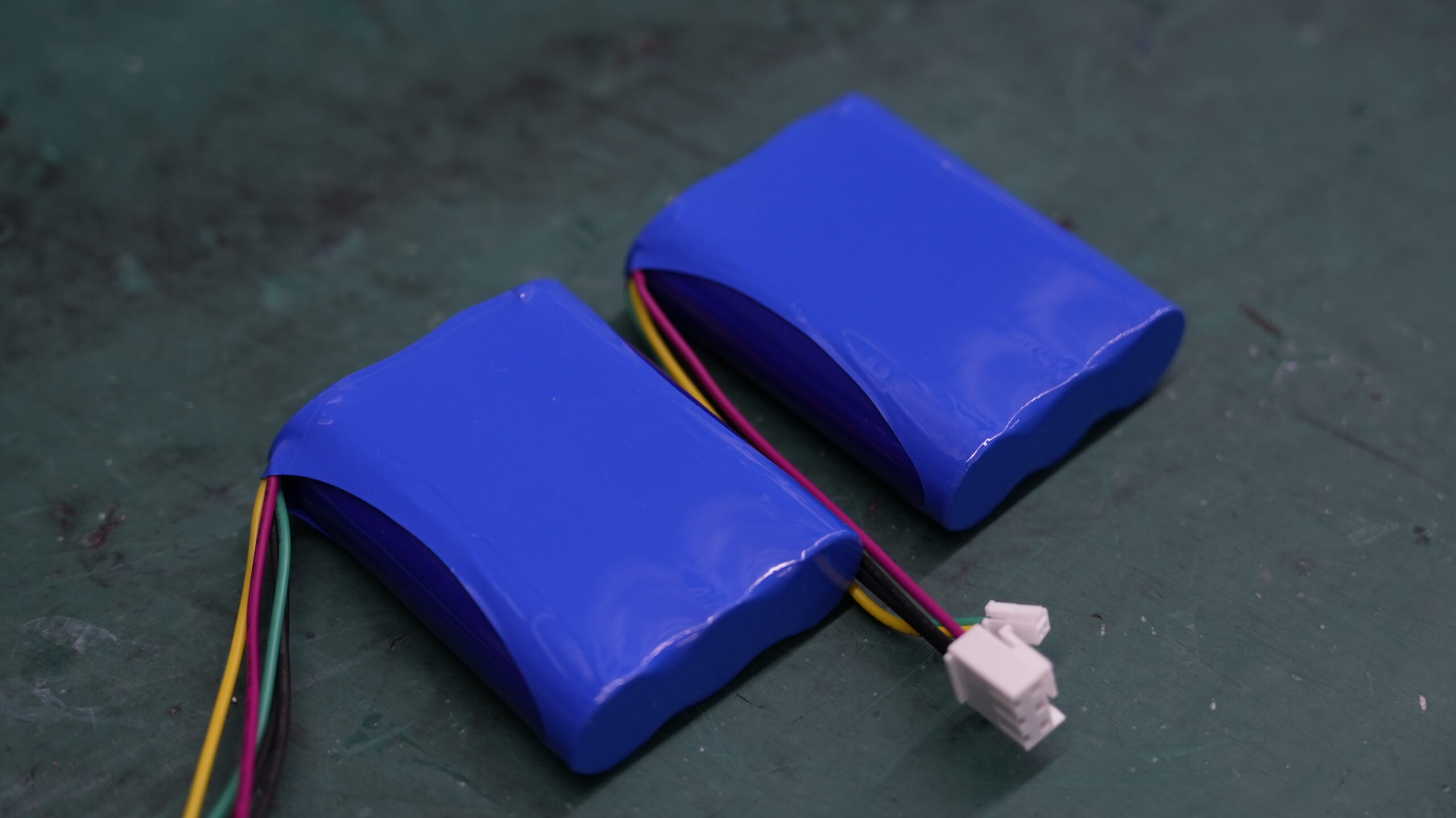
2.1 Lithium-ion
When you select a lithium-ion battery pack for sleep therapy devices, you gain high energy density and long cycle life. These batteries deliver reliable performance across a wide temperature range and require minimal maintenance. Their advanced chemistries, such as NMC and LCO, offer strong energy output, but you must ensure robust battery management systems for safety.
Battery Chemistry | Energy Density | Cycle Life | Maintenance | Safety & Stability | Suitability for Medical Devices |
|---|---|---|---|---|---|
Lead Acid | Low | Short | High | Lower | Less suitable |
NiMH | Moderate-High | Moderate | Moderate | Some memory effect | Limited |
Lithium-ion | High | Long | Low | High with BMS | Highly suitable |
LiFePO4 | Moderate | Very Long | Low | Highest | Preferred for safety |
Lithium-ion batteries in medical applications can last up to 20 years and endure up to 5,000 charge cycles. Their stability and reliability make them a leading choice for sleep therapy devices.
2.2 LiFePO4
LiFePO4 batteries set the standard for safety and longevity in sleep therapy applications. You benefit from superior thermal stability, which reduces fire risk and supports continuous overnight use. These batteries operate efficiently from -20°C to 60°C, making them ideal for diverse environments.
LiFePO4 batteries provide thousands of charge cycles, outlasting typical lithium-ion packs.
Their chemistry contains no cobalt or nickel, making them more environmentally friendly. For more on sustainability, see Our Approach to Sustainability.
Their safety profile makes them the preferred choice for critical medical devices.
Lithium-ion Chemistry | Thermal Stability | Notes on Medical Use | |
|---|---|---|---|
LFP (LiFePO4) | Highest | Excellent | Preferred for safety |
NMC | Moderate | Moderate | Good with BMS |
LCO | Lower | Sensitive | Needs strict BMS |
2.3 Custom vs. Standard Packs
You may require a custom lithium battery pack when your device demands high safety, compact size, or extended runtime. Custom packs integrate advanced Battery Management Systems, support seamless device integration, and meet strict medical standards. For example, a custom medical battery pack can provide uninterruptible power, lightweight design, and FAA compliance for travel. Standard packs offer convenience, but custom solutions deliver tailored performance and regulatory assurance.
For tailored solutions, request a custom consultation to optimize your sleep therapy device’s battery pack for safety, compliance, and operational needs.
Part 3: Choosing the Lithium Battery of Sleep Therapy Devices
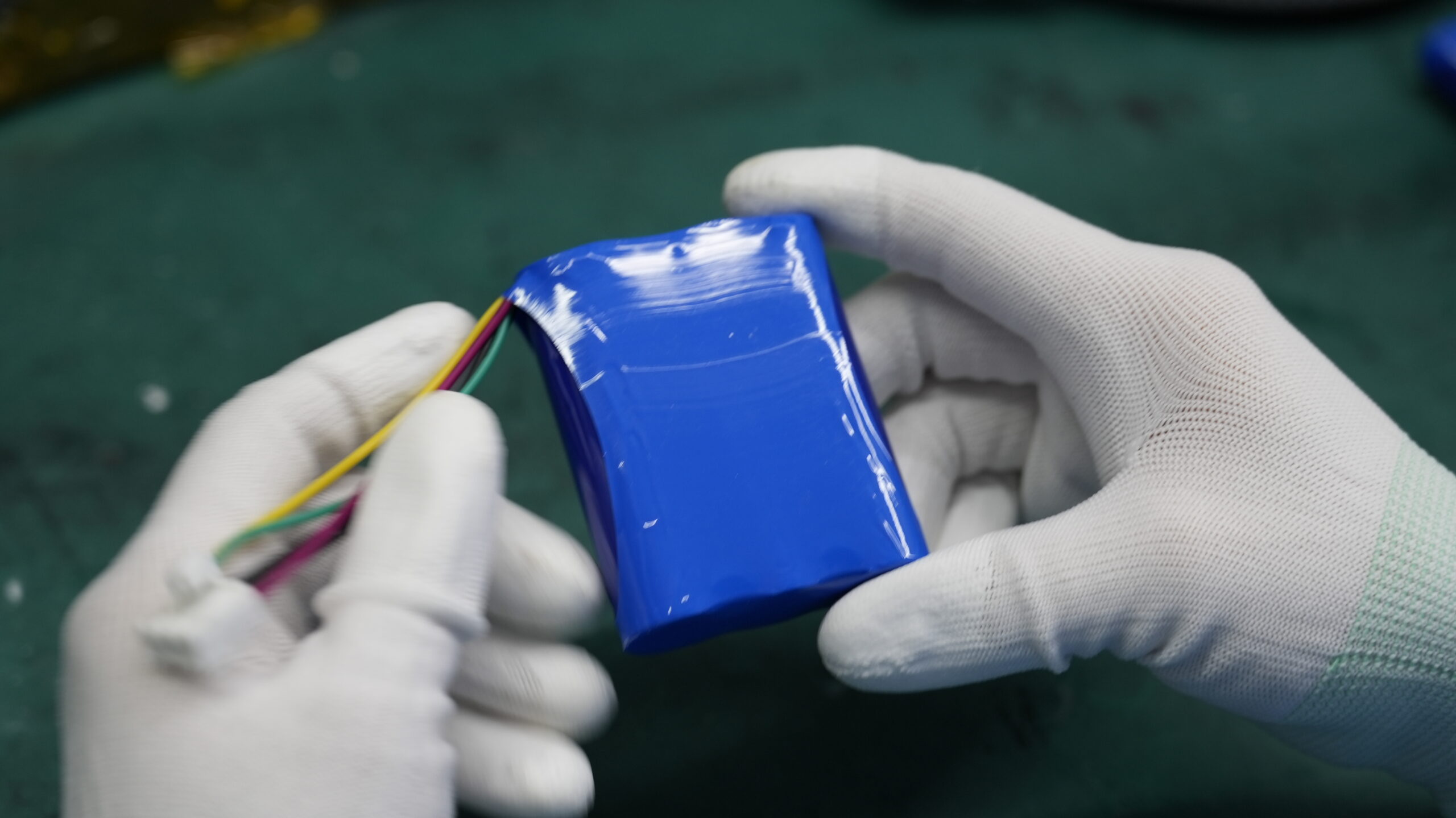
3.1 For Sleep Apnea
When you select a lithium battery for sleep apnea therapy, you must focus on uninterrupted operation and device compatibility. The most critical specifications include:
Dual voltage compatibility (12V/24V) for broad device support.
Sufficient battery capacity (watt-hours) to deliver at least 8-16 hours of runtime.
Accurate voltage and connector matching to prevent device damage.
Flexible charging options, such as AC, DC, and solar adapters.
Safety features that prevent overheating and ensure stable operation.
You should always verify that your cpap backup battery matches the voltage and connector type of your sleep apnea device. Runtime can vary based on pressure settings and accessories like humidifiers. Monitoring features, such as digital displays, help you track remaining power and avoid unexpected shutdowns. Lithium-ion and LiFePO4 chemistries offer high energy density and long lifespan, making them ideal for sleep apnea therapy.
3.2 For Travel & Portability
Travel and portability requirements demand lightweight, compact cpap travel batteries with FAA/TSA approval. High energy density allows you to carry more power in a smaller package, which is essential for frequent travelers. The following table compares leading portable cpap battery models:
Battery Model | Weight | Runtime | TSA/FAA Compliance | Notes |
|---|---|---|---|---|
Medistrom Pilot-24 Lite AirMini Battery | 1.3 lbs | Up to 16 hours | FAA/TSA compliant | Compact, durable aluminum case, ideal for travel and camping. |
Zopec Explore Mini | 1.2 lbs | Up to 2 nights | FAA-approved | Fast USB-C charging, broad compatibility, includes adapter cables. |
Transcend Micro PowerAway | 16.7 oz | Up to 3 nights | FAA-approved | Ultra-light, solar charger compatible, designed for Transcend Micro CPAP. |
Lofta Explore 5500 | 3 lbs | Up to 21 hours | May have restrictions | Longer runtime, heavier, solar panel compatible. |
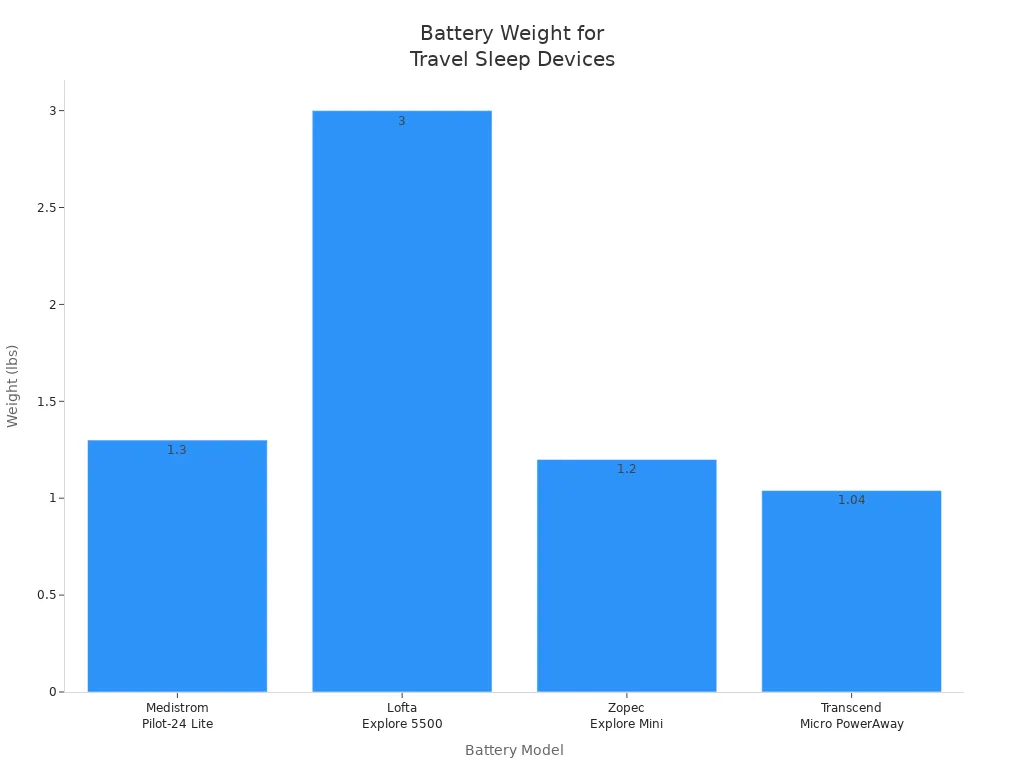
You should prioritize cpap travel batteries that balance runtime, weight, and compliance. FAA-approved models like the Medistrom Pilot-24 Lite and Zopec Explore Mini provide reliable power for sleep apnea therapy during flights and remote travel. Choosing a cpap travel battery with flexible charging options, such as USB-C or solar, ensures uninterrupted therapy in any environment.
3.3 Impact Resistance
Impact resistance is essential for cpap backup battery safety, especially in demanding environments. Lithium batteries for sleep therapy devices must comply with recognized safety and mechanical testing standards, including:
IEC 62133
IEC 60086-4
UL 1642
UN Manual of Tests and Criteria Sub-section 38.3
These standards require environmental, mechanical, and electrical tests, including impact resistance. Compliance ensures that your portable cpap battery can withstand shocks and drops during transport or daily use. Always confirm that your cpap backup battery meets these certifications to guarantee safe and reliable operation for sleep apnea therapy.
To choose the best lithium battery pack for sleep therapy devices, you should:
Confirm technical compatibility, safety, and compliance certifications.
Review supplier reliability and technical specifications.
Request samples for testing.
Maintain batteries properly to ensure long-term performance.
Prioritize ongoing maintenance and supplier consultation to maximize device reliability and patient outcomes.
FAQ
What makes LiFePO4 batteries the safest choice for sleep therapy devices?
LiFePO4 batteries offer superior thermal stability and long cycle life. You reduce fire risk and ensure continuous, reliable operation for medical applications. Large Power recommends LiFePO4 for critical use.
How do you ensure lithium battery packs meet regulatory compliance?
You should verify certifications like UN38.3, IEC 62133, and FDA 510(k). Large Power provides full documentation and custom battery solutions for strict compliance. Request a custom consultation.
Can you customize lithium battery packs for unique device requirements?
Yes. Large Power engineers custom lithium battery packs for medical, robotics, security, and industrial applications. Click here for a custom battery solution.




